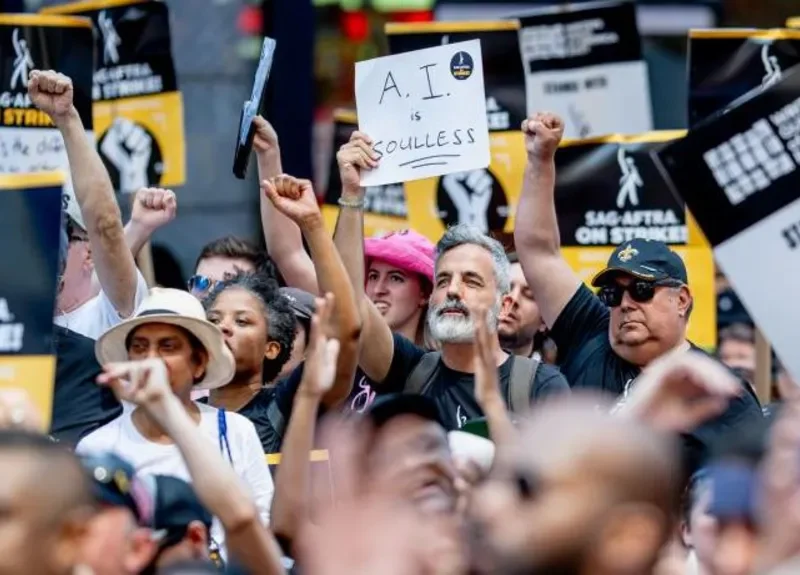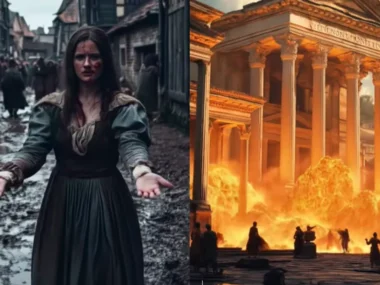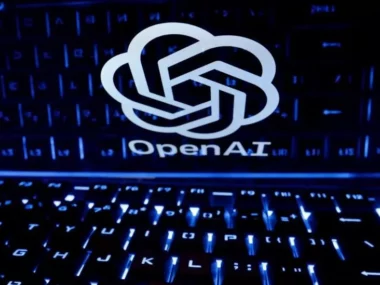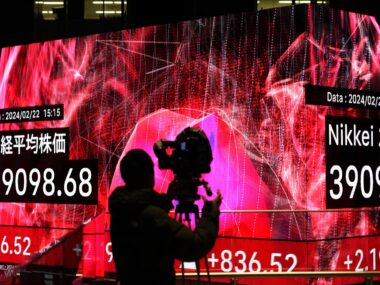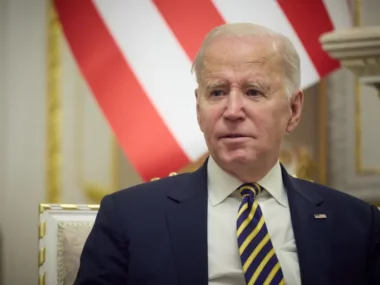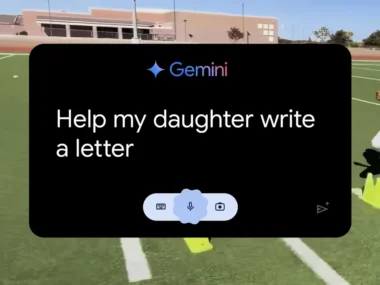Inside a soundstage once used by silent film legends Charlie Chaplin and Mabel Normand, Hollywood executives, actors, and filmmakers mingled over cocktails, admiring what some consider the greatest innovation since the introduction of sound in film: AI-generated video.
However, whether AI represents the future or the downfall of cinema remains uncertain.
Just two years ago, actors and writers went on strike, halting Hollywood’s production over concerns about AI and its impact. Today, the technology is gradually infiltrating TV, movies, and video games, with even two Oscar-winning films incorporating AI.
Amid a backdrop of ’90s hip hop played by a DJ, developers, actors, and executives networked, signaling the shifting power dynamics in the industry.
AI in Hollywood is “inevitable,” says Bryn Mooser, the event’s host and co-founder of Moonvalley, which developed the AI tool “Marey” by compensating filmmakers for their footage. Mooser acknowledges AI’s controversial reputation but defends his product as “clean” due to its fair payment model.

Filmmakers, executives, and actors mingled at the new AI production company.
AI may have a negative reputation in Hollywood, but Mr. Mooser believes his version of the technology is “clean.”
“Artists should be at the table,” he states, emphasizing the importance of creating tools for filmmakers rather than being overtaken by large tech corporations.
For years, AI has been portrayed as a villain in Hollywood. In “The Terminator,” AI used by the US military decides to eliminate humanity.
However, it’s the creators of AI, rather than the technology itself, that have faced the most criticism. Companies have used publicly available data, including copyrighted material shared online, to train AI models, leading to claims of exploitation from creators who argue their work is being stolen.
OpenAI, Google, and other tech giants are currently facing lawsuits from writers, actors, and news organizations accusing them of using their content to train AI without consent. Although studios like Paramount, Disney, and Universal, which hold movie and TV show copyrights, have been urged by writers to take legal action, none have pursued lawsuits yet.
“We’ve all fought hard for copyright laws, and no one wants to see their work stolen for others to profit,” says Mr. Mooser.
Hollywood has started experimenting with AI technology. Oscar-nominated films like Emilia Perez and The Brutalist used AI to modify voices. Adrian Brody won the Academy Award for best actor, with AI helping to refine his Hungarian accent in The Brutalist. AI has also been used to de-age actors such as Tom Hanks and Harrison Ford.

Generative AI was used to refine Adrian Brody’s Hungarian accent in The Brutalist.
AI is becoming increasingly prevalent. Earlier this month, OpenAI hosted an AI film festival in Los Angeles, while Marvel directors Joe and Anthony Russo revealed plans to invest $400 million in developing AI tools for filmmakers.
However, its long-term impact on the entertainment industry remains uncertain. Generative AI enables computers to learn and solve problems in ways that mimic human thinking—only much faster. Many fear the technology will replace jobs, as AI is now capable of generating scripts, animation, locations, voices, and even human actors.
According to OpenAI’s ChatGPT, background actors are the most at risk of being replaced by AI, while “A-list actors & directors” are the safest due to their star power and brand recognition.
At the Moonvalley party, AI was the main topic of conversation, though few attendees were willing to discuss it publicly. Despite the rain, many industry leaders traveled from West Los Angeles to Silver Lake, a rare occurrence in LA.
“We’re here to learn,” said one executive who endured an hour of traffic to attend. “We’re not signing or buying anything, but we’re interested.”
Moonvalley co-founders Bryn Mooser and Naeem Talukdar believe AI will reshape Hollywood, making high-budget productions more accessible. While the technology could lead to an influx of subpar films, they argue it could also help discover the next Quentin Tarantino or Martin Scorsese—regardless of studio backing.
“This technology means nothing without the artist at its core,” says Talukdar. “Ultimately, AI must serve the artist, not replace them.”

Arnold Schwarzenegger portrayed a deadly AI in The Terminator.
Hollywood’s embrace of AI coincides with the Trump administration’s development of a new national AI strategy.
Tech companies argue that current U.S. copyright laws hinder their ability to compete with China. They claim unrestricted access to copyrighted content—from Mickey Mouse to Moana to The Matrix—is essential for training AI models and maintaining national security.
Google and OpenAI are lobbying for copyrighted films, TV shows, and artwork to be classified as “fair use” for AI training. Without this exemption, they warn, the U.S. risks falling behind in the global AI race.
Hollywood filmmakers counter that tech firms are undermining the entertainment industry, which supports over 2.3 million American jobs.
A coalition of more than 400 Hollywood A-listers, led by actress and writer Natasha Lyonne—who helped develop Moonvalley—expressed their concerns in an open letter to the Trump administration. The letter, submitted as part of the AI Action Plan’s public consultation, emphasizes that America’s AI leadership should not come at the cost of its creative industries.
Signatories included major stars such as Ben Stiller, Paul McCartney, Cate Blanchett, and Lilly Wachowski, co-creator of The Matrix, a film that depicts a dystopian world where AI enslaves humanity.
The entertainment industry remains deeply concerned about AI’s impact on jobs.
Earlier this month, actors protested outside Disney Character Voices, demanding stronger protections against AI’s role in video games.
“Real actors bring lived experiences that AI simply can’t replicate,” said actor DW McCann, arguing that human performances are vital to the drama and engagement in gaming.
The striking actors seek a contract ensuring their voices and likenesses won’t be used without consent to train AI models that could replace them.
Mr. Mooser believes AI can empower filmmakers to create extraordinary art—if used responsibly. With humans in control, AI could streamline set and world-building, making productions faster and more accessible than traditional visual effects.
“Technology will be in everything,” he says. “We need to fight to ensure it’s implemented the right way—so artists aren’t sidelined by big corporations.”

